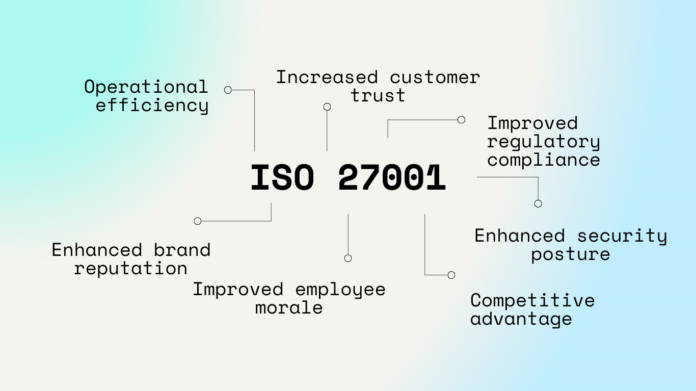In today’s digital age, information is king. Businesses and organizations hold a treasure trove of sensitive data – customer records, financial information, intellectual property – and protecting it is paramount. Enter ISO 27001, the international standard that acts as a fortress for your information security management system (ISMS).
This blog post delves into the world of ISO 27001, unpacking its core principles, benefits, implementation process, and the recently introduced changes in the 2022 revision.
What is ISO 27001?
Developed by the International Organization for Standardization (ISO) and the International Electrotechnical Commission (IEC), ISO 27001 is not a prescriptive set of rules, but rather a framework. It provides organizations with a systematic approach to managing information security risks, ensuring the confidentiality, integrity, and availability (CIA) of their data.
Core Principles of ISO 27001:
- Risk-based approach: ISO 27001 emphasizes identifying, analyzing, and prioritizing information security risks. Resources are then allocated based on the severity of the risks.
- Continuous improvement: Cybersecurity is an ongoing battle. ISO 27001 promotes a continuous improvement cycle, where the ISMS is regularly reviewed and updated to adapt to evolving threats.
- Management commitment: For successful implementation, top-level management must demonstrate a strong commitment to information security and actively support the ISMS.
Benefits of ISO 27001 Certification:
- Enhanced security posture: Implementing an ISMS based on ISO 27001 significantly reduces the risk of cyberattacks and data breaches. By systematically identifying, analyzing, and prioritizing information security risks, you can allocate resources effectively to address the most critical vulnerabilities. ISO 27001 also promotes a continuous improvement cycle, ensuring your defenses stay up-to-date against evolving threats.
- Increased customer trust: In today’s data-driven world, customers are increasingly concerned about the security of their personal information. Certification demonstrates to clients and partners your commitment to information security. This fosters trust and transparency, potentially leading to new business opportunities and stronger customer relationships.
- Improved regulatory compliance: Many data privacy regulations around the world have requirements that overlap with the controls outlined in ISO 27001. By implementing an ISMS that adheres to ISO 27001, you can simplify compliance with these regulations, saving time and resources.
- Operational efficiency: A well-defined ISMS can streamline information security processes and improve overall operational efficiency. By establishing clear roles and responsibilities, and implementing standardized procedures, you can ensure consistent and effective information security practices across the organization.
- Competitive advantage: In some industries, ISO 27001 certification can be a differentiator when bidding for contracts or tenders. Demonstrating a robust information security management system can give your organization a competitive edge.
- Improved employee morale: Knowing that their employer is taking steps to protect their data and privacy can boost employee morale and reduce security-related anxieties.
- Enhanced brand reputation: A data breach can severely damage an organization’s reputation. ISO 27001 certification demonstrates a proactive approach to information security, helping to mitigate reputational risks.
The Road to Certification:
Obtaining ISO 27001 certification involves several steps:
- Gap analysis: Assess your current information security practices to identify areas that need improvement.
- Develop an ISMS: Create a documented information security management system aligned with ISO 27001 requirements.
- Implementation and operation: Implement the controls outlined in your ISMS and establish processes for ongoing management.
- Internal audit: Conduct an internal audit to verify the effectiveness of your ISMS.
- Certification audit: An accredited certification body will audit your ISMS to confirm compliance with ISO 27001.
What’s New in ISO 27001:2022?
The latest revision of ISO 27001, published in 2022, streamlines the standard for better usability. Key changes include:
- Simplified Annex A: The number of security controls has been reduced and restructured, making them easier to understand and implement.
- High-level structure alignment: ISO 27001 now aligns with the Annex SL structure used in other ISO management system standards, simplifying integration with existing systems.
- Emphasis on organizational context: The revised standard encourages considering the organization’s specific context when implementing the ISMS.
Conclusion:
ISO 27001 is a powerful tool for organizations of all sizes that want to safeguard their information assets in a constantly evolving threat landscape. While achieving certification requires dedication and resources, the benefits of a robust ISMS far outweigh the initial investment. Remember, information security is an ongoing journey, and ISO 27001 provides the roadmap to a secure digital future.


